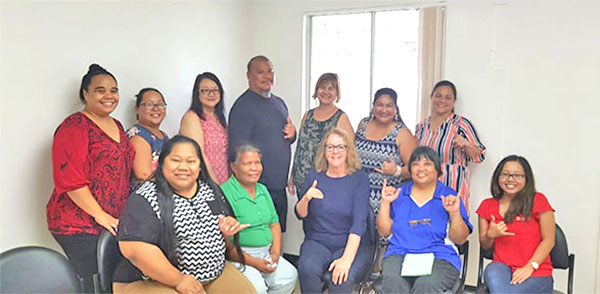Disability partners discuss iCanConnect Program updates

Representatives from various DNP agencies or organizations are shown in this group photo after a productive meeting regarding the CNMI’s iCanConnect Program on Sept. 20, 2018. Seated from left to right are: OVR Counselor Shana Iguel, ILOB caseworker assistant Ellena Sutton, Cathy Kirscher of the Helen Keller National Center in San Diego, CA, OVR counselor Jane Tudela and acting director for Learning Supports Services Kaelani Demapan. Standing from left to right are: OVR administrative assistant Elvira Seman, WIA Federal Program coordinator and SRC interim chair Frances Torres, OVR director Arlene Yamagata, AT Program coordinator Raymond Diaz, CLI executive director Susan Satur, UCEDD Program manager Jennifer Castro, and DSS counselor Lucille Deleon Guerrero. (Contributed Photo)
Last Sept. 20, the Disability Network Partners, or DNP, met with Cathy Kirscher of the Helen Keller National Center of San Diego, California at the Office of Vocational Rehabilitation (OVR) to discuss updates regarding the CNMI’s iCanConnect Program. This is Kirscher’s second visit to the islands.
DSP is comprised of the Office of Vocational Rehabilitation/Independent Living Older Blind Program, Assistive Technology Program/Council on Developmental Disabilities, Northern Marianas College (University Centers for Excellence in Developmental Disabilities, Disability Supports Services, and Learning Supports Services), Center for Living Independently, Department of Labor/Workforce Investment Agency Division, and the State Rehabilitation Council.
The CNMI, through the Federal Communications Commission, was allotted $51,120 for 2018-2019 to provide individuals, with both significant vision and hearing loss, with free equipment and training through the iCanConnect Program, a national program that helps people stay connected with the world.
So far, the CNMI iCanConnect Program has conducted outreaches to increase public awareness about the program and continues to provide services to a qualified individual from Tinian so that with technology, she may be connected with family and friends.
Kirscher is the regional representative for the Southwest region that includes the U.S. Territories, and she manages the CNMI’s funds. She reported during the meeting that last year some of the unspent funds were diverted to Hawaii and New York to help meet the technology needs of folks who have both vision and hearing impairments.
According to Kirscher, we will need to increase the number of individuals served by this program. In Guam, they have about four or five individuals who are being served, but then their population is about three times that of the CNMI.
Ellena Sutton, caseworker assistant for the Independent Living Older Blind Program with OVR, also met with Kirscher regarding two ILOB referrals: one from Saipan and the other from Rota. We are hoping that the number of referrals will continue to increase.
If you know of anyone who has both vision and hearing impairments, refer them to the iCanConnect Program by contacting Raymond Diaz, Assistive Technology Program coordinator, at 664-7003 or Carla Torres, ATP, at 483-1143.
Also, please help to spread the word about the iCanConnect Program. For more information including how to apply, check out www.icanconnect.org. (PR)



























